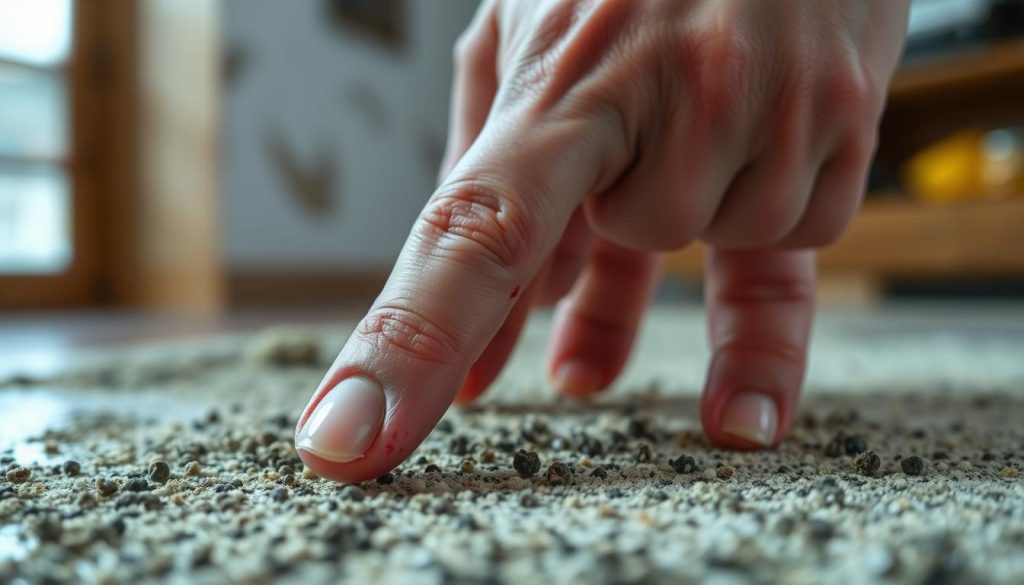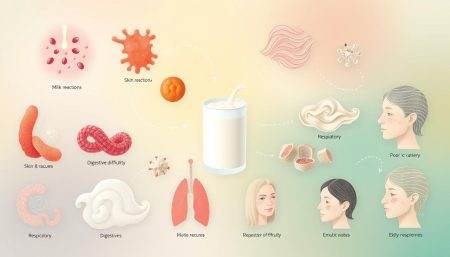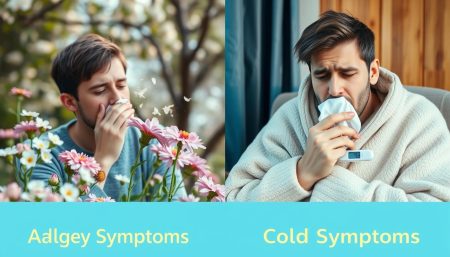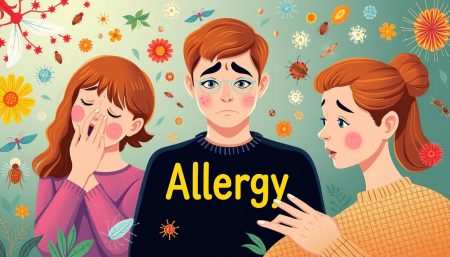Breathing in mold spores can be harmful, especially for those with sensitivities. It’s important to know the mold allergy symptoms to stay healthy. These symptoms include coughing, itchy eyes, and trouble breathing.
Knowing these signs is crucial. It helps people take steps to improve their health. With the right info, those with mold allergies can manage their condition better.
An allergic reaction to mold is common. Mold spores can be found indoors and outdoors. Knowing about mold allergy symptoms helps people protect their health.
It’s the first step in fighting mold allergies. By learning to identify these signs, you can keep yourself safe from mold’s harmful effects.
Key Takeaways
- Recognizing mold allergy symptoms is essential for those susceptible to mold-related health issues.
- Mold spores can be encountered in various environments, both indoors and outdoors.
- Typical signs of mold allergies extend to respiratory and skin reactions.
- Proactive management of the environment can mitigate exposure to mold spores.
- Understanding the triggers and symptoms allows for more effective treatment and lifestyle adjustments.
- Seeking professional medical advice is imperative when symptoms worsen or persist.
Understanding Mold Allergy Symptoms
It’s important to know the signs of mold allergies to manage and treat them well. Mold allergies can cause many symptoms, similar to other common allergies.
Identifying Common Mold Allergy Signs
People with mold spore allergy symptoms often have trouble breathing. They might sneeze, have a runny nose, itchy eyes, and feel congested. Skin irritation or rashes can also happen, especially when mold levels are high.
Some might experience allergic rhinitis from mold. This means they sneeze a lot and have an itchy, dripping nose.
Differentiating Between Mold Allergies and Other Allergies
It’s key to tell mold allergy symptoms apart from other allergies. Knowing the difference helps avoid wrong diagnoses and find better treatments. Mold allergies usually get worse in wet and damp weather.
Other allergies, like pollen, have a specific time of year, like spring or early fall. Understanding these differences helps find the right treatment for each person.
Causes of Mold Allergies
The causes of allergic reactions to mold start with how our immune system reacts to mold spores in the air. Molds are fungi that grow well in damp places. When they spread, they release tiny spores into the air. These spores are usually harmless but can cause big problems for people who are allergic.

It’s important to know why some people get so sensitive to mold. People with mold allergies think mold spores are like viruses or bacteria. This makes their body react as if it’s fighting off an infection.
Mold allergy symptoms often start with breathing problems. But they can also affect other parts of your health. Here’s a look at some common molds and how they can make people sick:
| Mold Type | Common Locations | Typical Allergic Symptoms |
|---|---|---|
| Aspergillus | Indoors: damp walls, decomposing vegetation | Nasal congestion, watery eyes, coughing |
| Cladosporium | Indoors and outdoors: fabrics, woods | Skin rash, throat irritation |
| Penicillium | Indoors: wallpaper, insulation | Sinusitis, asthma |
| Alternaria | Outdoors: soil, plants, rotting wood | Sneezing, dry skin, exacerbated asthma |
For those who are allergic to mold, finding ways to manage it is key. Knowing which molds are common and where they live can help. This knowledge can help reduce how often you have allergic reactions.
Risks Associated with Mold Exposure
Mold is everywhere, indoors and outdoors. It can harm our health in different ways. Knowing the risks of mold exposure helps us avoid health problems. This part talks about the immediate and long-term health effects of mold.
Short-Term Mold Exposure Symptoms
Being around mold for a short time can cause problems. People, especially those with allergies, might feel stuffy, have itchy eyes, or cough. Those with mold allergies might have more serious breathing issues.
Long-Term Health Effects of Mold Allergies
Long-term mold exposure is serious. It can hurt your breathing system a lot. It might lead to chronic sinusitis, make asthma worse, or cause severe infections. Here’s a table showing the differences between short-term and long-term effects:
| Exposure Duration | Symptoms | Potential Health Outcomes |
|---|---|---|
| Short-Term | Nasal stuffiness, eye irritation, wheezing, skin rash | Immediate discomfort, potential acute allergic reactions |
| Long-Term | Chronic coughing, sinusitis, worsening of asthma, respiratory infections | Chronic respiratory conditions, potential permanent damage to the respiratory tract |
It’s important to know about these risks and mold allergy symptoms. Doctors and patients need to be aware to handle mold exposure well. Quick action can lessen the harm mold can cause.
Types of Mold that Trigger Allergic Reactions
Knowing about types of mold allergies is key to dealing with mold allergy symptoms. Molds fall into indoor and outdoor groups, each with its own species that can cause allergies. This section will look at these groups and highlight the common molds in homes that lead to allergies.
Indoor Molds vs. Outdoor Molds
Indoor and outdoor molds have different homes and effects on allergies. Indoor molds live in damp places like basements and bathrooms. They stay all year, causing ongoing allergy symptoms. Outdoor molds are in soil and decaying matter, growing in warm, wet weather.
Common Household Molds and Allergies
In many homes, molds like Aspergillus, Cladosporium, and Penicillium are common. These molds are widespread and can cause allergies. Aspergillus is on damp walls and in air conditioners. Cladosporium is on fabrics and wood, and Penicillium is on wallpaper and carpets. Each mold can release spores that cause allergies when inhaled.
| Mold Type | Common Locations | Associated Allergy Symptoms |
|---|---|---|
| Aspergillus | Damp walls, air conditioners | Nasal congestion, wheezing |
| Cladosporium | Fabrics, wood surfaces | Sneezing, itchy throat |
| Penicillium | Wallpaper, carpets | Cough, red eyes |
- Indoor molds are often persistent and can cause year-round allergy symptoms.
- Outdoor molds may cause seasonal allergies, flaring up under specific conditions.
Knowing about these types of mold allergies and their health impacts is important. It helps prevent long-term exposure and manage mold allergy symptoms better. Keeping your home clean and controlling humidity can help reduce mold and allergies.
Mold Allergy Symptoms in People with Asthma
For people with asthma, mold can make their condition worse. This section explores how mold and asthma symptoms are linked. It also talks about how to treat mold allergies, especially for those with asthma.
Mold spores can trigger asthma attacks. When breathed in, they cause airway inflammation. This leads to symptoms like wheezing, coughing, and breathing problems. Knowing this helps manage health risks from mold.
| Symptom | Common in Asthma | Triggered by Mold |
|---|---|---|
| Wheezing | Yes | Often |
| Shortness of Breath | Yes | Frequently |
| Coughing | Yes | Commonly |
| Chest Tightness | Yes | Sometimes |
Proactive management and prevention are key for those with mold allergies and asthma. Keeping humidity low, cleaning air filters, and using air purifiers help. These steps reduce mold spores in the air.
- Regularly check living spaces for mold.
- Use dehumidifiers in damp areas like basements and bathrooms.
- Make sure there’s good ventilation to prevent mold spore buildup.
- Act fast to remove any mold you see.
Using these methods can lower mold exposure and help prevent asthma attacks. It’s important for asthma patients to talk to their doctors about treating mold allergies.
Understanding and managing mold exposure is a vital step in protecting asthma patients from severe symptoms and improving their quality of life.
Allergic Rhinitis from Mold
Allergic rhinitis from mold is a common problem for many people. It happens when they breathe in mold spores, leading to swelling in the nasal passages. This issue can last all year, depending on how much mold is around.

The symptoms can be quite bothersome. To find relief from mold allergies, it’s key to know the signs and use the right treatments.
Symptoms of Mold-Induced Rhinitis
- Nasal congestion and runny nose
- Sneezing and itching
- Watery, red eyes
- Postnasal drip
- Fatigue
Treating Allergic Rhinitis Caused by Mold
To manage mold allergies, a mix of prevention and treatment is needed. Finding relief means tackling both the environment and the symptoms.
- Environmental Control: Keeping places dry and clean is the first step. Use dehumidifiers and fix leaks quickly.
- Medications: Antihistamines, nasal sprays, and decongestants can help for a while.
- Long-term treatments: For serious cases, allergy shots might be suggested.
Mold Spore Allergy Symptoms
It’s key to know the mold spore allergy symptoms to get the right treatment fast. These signs are like other allergies but are caused by mold spores. Knowing the signs of mold allergies helps people find the right care.
Symptoms of mold spore allergies can be different but often affect breathing and skin. Here are some common signs:
- Nasal congestion or runny nose
- Watery, red eyes
- Sneezing
- Itchy throat or ears
- Skin irritation or rash
- Asthma attacks or wheezing, especially in those previously diagnosed with asthma
These symptoms get worse in damp places like basements or bathrooms with bad air. Mold spores are hard to see, making them tough to avoid without keeping your home clean.
| Symptom | Common with Mold Allergies | Common with Other Allergies |
|---|---|---|
| Nasal Congestion | Yes | Yes |
| Watery, Red Eyes | Yes | Yes |
| Skin Rash | Yes | No |
| Wheezing/Asthma Flare | Yes | Sometimes |
Mold allergies can really mess up your day and life quality.
Diagnosing Mold Allergies
Diagnosing mold allergies involves a series of tests. These tests help both patients and doctors understand the issue. It’s important to know what these tests are and how to read the results.
Tests to Confirm Mold Allergy
Doctors use skin prick tests or specific IgE blood tests to check for mold allergies. These tests look for how the body reacts to mold spores. They help find out if someone has a mold allergy.
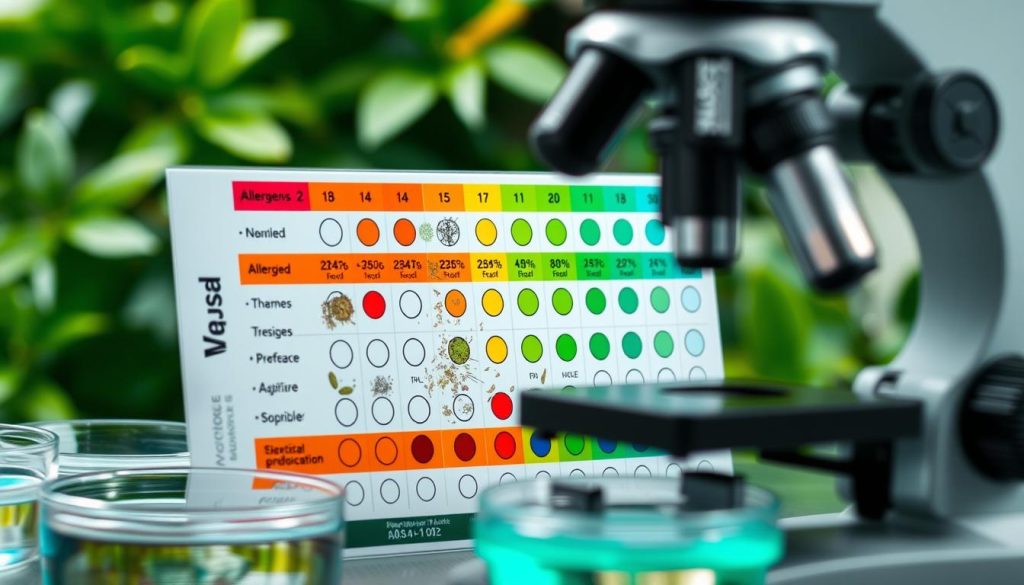
Interpreting Allergy Test Results
Understanding allergy test results is complex. It needs a good grasp of how the body’s immune system works. A positive test means the body reacts to mold allergens. This calls for more tests or changes in treatment and lifestyle.
| Test Type | Description | Interpretation |
|---|---|---|
| Skin Prick Test | A small amount of mold allergen is introduced to the skin to check for reactions. | A wheal or flare indicates a positive reaction, suggesting mold sensitivity. |
| Blood Test (Specific IgE) | Blood is tested for the presence of antibodies against mold allergens. | Higher IgE levels suggest a higher degree of mold allergy. |
Getting a mold allergy diagnosis right is key. It helps people understand and deal with their allergies. These first steps are crucial for managing mold allergies effectively.
Managing and Treating Mold Allergies
Understanding how to manage managing mold allergies is key. Knowing the best treatments and ways to prevent mold is important. This helps people live healthier lives with fewer allergy problems.
Mold Allergy Relief Strategies
Mold allergy relief comes from changing your environment and cleaning regularly. Using dehumidifiers keeps humidity low, stopping mold from growing. Also, HEPA filters in air purifiers catch mold spores, lowering exposure and easing symptoms.
Using Medications to Alleviate Symptoms
How to treat mold allergies often involves medicines. Antihistamines quickly ease symptoms like a runny nose and itchy eyes. Nasal corticosteroids help control nasal congestion and swelling for longer. For serious cases, doctors might suggest allergy shots to build up a tolerance to mold spores.
| Medication Type | Purpose | Usage Notes |
|---|---|---|
| Antihistamines | Reduce immediate symptoms | Effective for quick relief; available OTC |
| Nasal corticosteroids | Control chronic symptoms | Prescription usually required; use as directed by a healthcare provider |
| Allergy Immunotherapy | Long-term symptom management | Requires a series of injections; commitment needed |
To better manage managing mold allergies, keep your indoor space clean and dry. Fixing leaks and ensuring good air flow are crucial. These steps help prevent mold from growing.
Preventing Mold Growth and Allergy Symptoms
Keeping your home mold-free is key to staying healthy and avoiding allergies. By taking steps to prevent mold growth and cleaning regularly, you can lower your exposure to mold spores.
Proactive Measures Against Mold
Keeping humidity levels between 30% and 50% is vital to stop mold. Use dehumidifiers and ensure good air flow in wet areas like bathrooms and kitchens. Fix any leaks quickly in roofs, windows, and pipes.
Also, limit the number of houseplants since they can hide mold in their soil.
Cleaning and Maintaining Mold-Free Environments
Cleaning often is crucial in fighting mold. Clean walls, floors, and ceiling tiles with solutions that fight mold. Also, check and clean air ducts and filters to stop mold spores from spreading.

Here’s a simple table with daily, weekly, and monthly cleaning tasks to prevent mold:
| Frequency | Area | Action |
|---|---|---|
| Daily | Kitchen/Bathroom | Wipe surfaces with a dry cloth to remove moisture; use an anti-mold spray as needed. |
| Weekly | Windows/Doors | Clean seals and frames to prevent moisture buildup. |
| Monthly | Basement/Attic | Inspect for leaks and ensure good air circulation. |
By sticking to these tips and keeping a clean home, you can make your living space safer and mold-free. This will help reduce mold allergies and improve the air you breathe.
Lifestyle Adjustments for Living with Mold Allergies
Living with mold allergies means more than just seeing a doctor. You also need to make lifestyle changes to avoid mold. These changes can help reduce symptoms and make life better. We’ll look at personal habits and environmental changes that help manage mold allergies.
Managing allergies starts with your environment. Making your home less welcoming to mold can cut down on allergic reactions.
- Keep humidity levels low, between 30% and 50%, using dehumidifiers if needed.
- Make sure damp areas like kitchens and bathrooms have good ventilation.
- Clean and replace HVAC filters to stop mold spores from spreading indoors.
- Choose mold-resistant paint and materials for renovations or repairs.
Changing your personal habits is also key in managing mold allergies. This includes what you eat and how you clean:
- Eat foods that fight inflammation, like turmeric, ginger, and omega-3s.
- Wear a mask when cleaning, gardening, or outside during pollen seasons.
- Store outdoor gear and clothes outside or in mudrooms to keep spores out.
- Quickly clean and dry wet areas to stop mold from growing.
Sticking to these lifestyle changes can greatly improve your health and reduce mold allergy symptoms.
When to Seek Medical Attention
Knowing when mold exposure turns into a medical emergency is key. Spotting severe symptoms early can greatly improve treatment outcomes. This is especially true for those with a severe allergic reaction to mold.
Recognizing Severe Allergic Reactions to Mold
Severe allergic reactions to mold, like anaphylaxis, are life-threatening and need immediate help. Look out for signs like trouble breathing, swelling in the face or throat, a fast or weak heartbeat, dizziness, or a bad rash. These symptoms can come on fast and get worse quickly, so it’s crucial to act fast.
Emergency Treatment for Mold Exposure
If you think you’re having a severe allergic reaction to mold, get emergency help right away. Calling for emergency services can be a lifesaver. Move away from the mold to avoid more exposure until help arrives.

Conclusion
We’ve looked into mold allergy symptoms and how to manage them. It’s key to spot signs early to get help fast. This knowledge helps people understand their condition and why seeing a doctor is important.
Preventing mold allergies starts with avoiding mold spores and keeping a clean home. Knowing the dangers of mold is also crucial. There are many ways to deal with mold allergy symptoms, improving life quality for those affected.
Education is the key to fighting mold allergies. With the right info, people can tackle symptoms head-on. Remember, knowing what to do is powerful. With the right steps, managing mold allergies can lead to better health.
FAQ
Q: What are common mold allergy symptoms?
A: Mold allergy symptoms include sneezing and a runny or stuffy nose. Itchy eyes, nose, or throat, and wheezing or breathing difficulties are also common. Some people may get skin rashes.
Q: How can I differentiate between mold allergies and other allergies?
A: Mold allergy symptoms can be similar to other allergies. But, mold allergies often get worse in damp places or when touching moldy items. An allergist can help figure out what’s causing your symptoms.
Q: What causes an allergic reaction to mold?
A: Mold allergy happens when your immune system sees mold spores as threats. This makes your body release chemicals, causing symptoms.
Q: What are the short-term and long-term risks of mold exposure?
A: Short-term mold exposure can cause coughing, itchy eyes, and skin irritation. Long-term exposure can lead to serious health issues like chronic respiratory illnesses or ongoing allergies.
Q: Are there different types of mold that can cause allergies?
A: Yes, many types of mold can cause allergies. Common ones include Aspergillus, Cladosporium, and Penicillium. Both indoor and outdoor molds can affect sensitive people.
Q: How do mold allergies affect individuals with asthma?
A: Mold can make asthma attacks worse and more frequent for those with asthma. It can also increase airway inflammation and sensitivity, making symptoms harder to manage.
Q: What are the symptoms of allergic rhinitis caused by mold?
A: Mold-induced allergic rhinitis symptoms include a runny or stuffy nose and sneezing. You might also have sinus pressure, itchiness in the nose, and postnasal drip. Some people may have an itchy or sore throat.
Q: Are there specific symptoms caused by mold spore allergies?
A: Yes, mold spore allergies can cause sinus pressure and respiratory issues. You might cough, wheeze, or have skin reactions like rashes or hives.
Q: How are mold allergies diagnosed?
A: Mold allergies are diagnosed with skin prick tests or specific IgE blood tests. These tests show how your immune system reacts to mold. An allergist can use these results to confirm a mold allergy.
Q: What are the best ways to manage and treat mold allergies?
A: To manage mold allergies, avoid moldy areas and use dehumidifiers. Antihistamines, nasal corticosteroids, or allergy shots can also help reduce sensitivity.
Q: How can I prevent mold growth in my home?
A: Keep humidity levels low (30-50%) and fix water leaks. Clean and dry damp areas quickly. Good air circulation is also key to preventing mold.
Q: What lifestyle adjustments should I make to live comfortably with mold allergies?
A: To reduce symptoms, keep your home well-ventilated and low in humidity. Clean moldy surfaces and use allergy-proof covers for mattresses and pillows. An air purifier with a HEPA filter can also help.
Q: When should someone with a mold allergy seek medical attention?
A: If you have severe symptoms like shortness of breath or wheezing that doesn’t get better, seek help. Also, watch for signs of anaphylaxis, such as swelling of the throat, dizziness, or a rapid heart rate.












